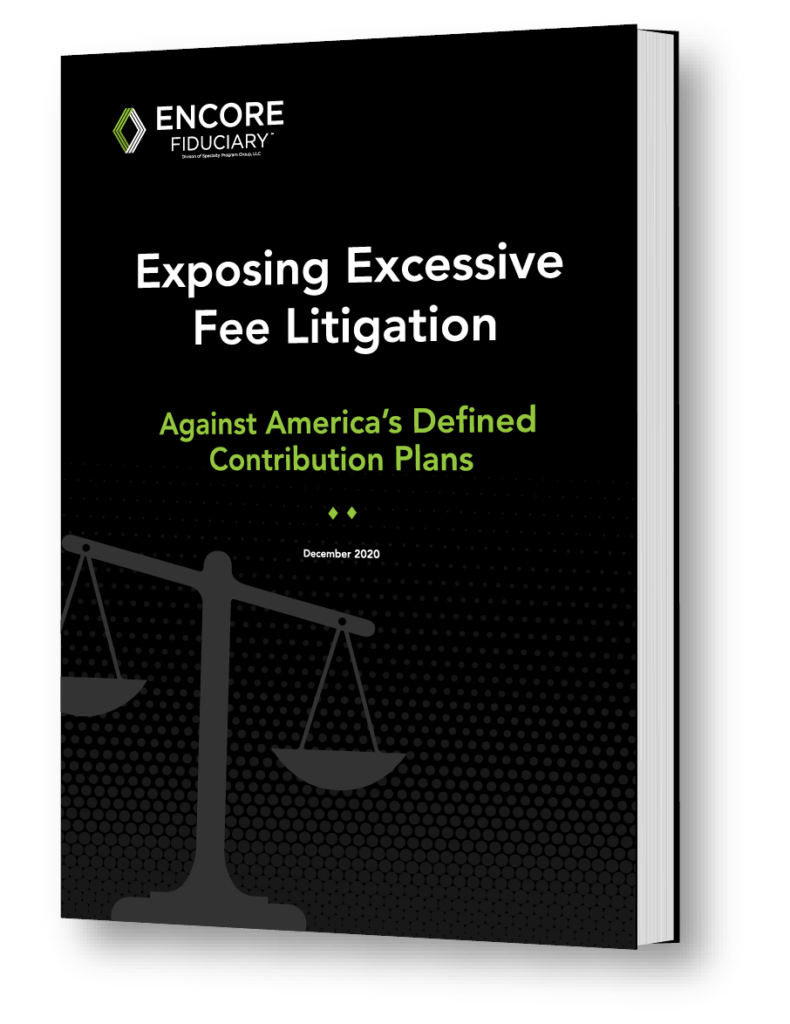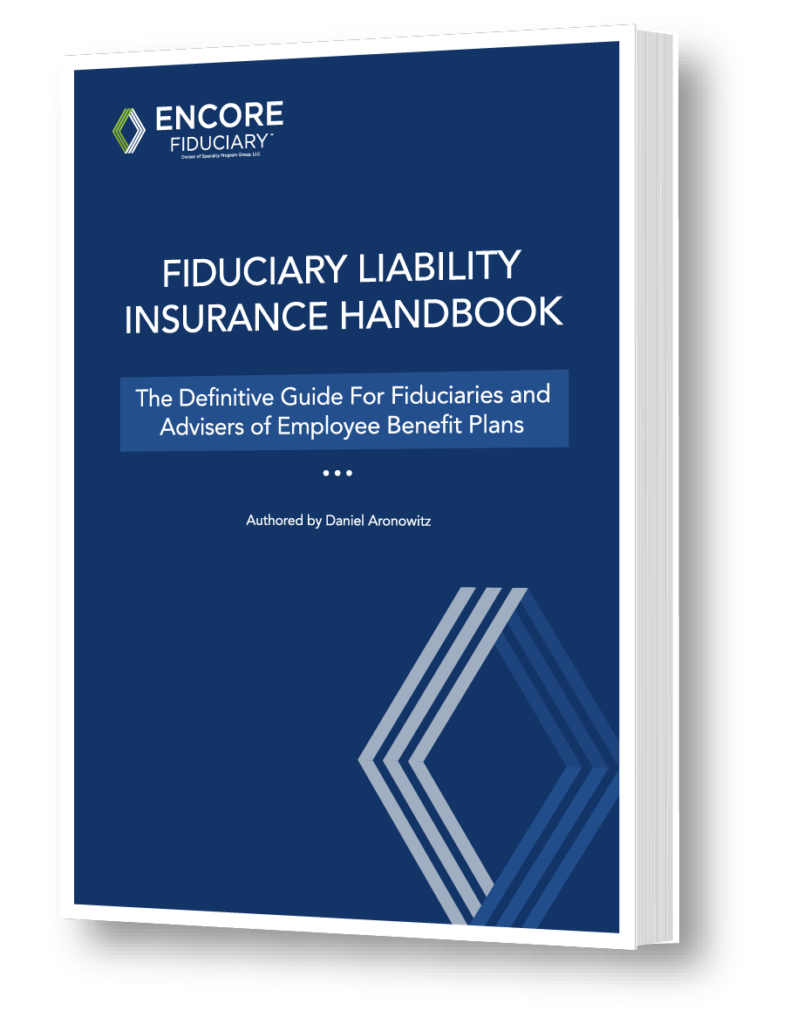KEY POINTS: (1) The court relied on plaintiff’s expert testimony that it is imprudent for fiduciaries to retain an investment that underperforms for twelve consecutive quarters. This is a warning to all plan fiduciaries that the retention of any investment that is underperforming – even in the short-term – can be second-guessed and lead to fiduciary liability.
(2) Despite five high-profile investment advisors and multiple investment tracking reports, the Court curiously held that there was no evidence that the plan considered the performance of the challenged investment. This is a reminder that every investment decision needs to be thoroughly documented to protect the record.
By Daniel Aronowitz
A key question for fiduciaries of retirement plans is how long to retain an investment that is underperforming the designated benchmark. We all know that it is imprudent to make frequent changes and chase short-term investment winners. We also know that retirement plans are designed for long-term results with investment horizons that are ten years or longer. But we live in a world in which plaintiff law firms pursue a business model designed to challenge and second-guess retirement plan fiduciaries with any investment that experiences poor investment results, even in the short-term. We thus need fiduciary law to protect the discretion of quality fiduciary committees to make deliberate decisions to retain investments when appropriate under a thoughtful monitoring process.
That is why the April 20, 2023 decision denying summary judgment to Verizon is so concerning, because the New York court accepted the testimony of a plaintiff’s expert that Verizon should have removed a single investment option in the plan after just thirty-six months of purported underperformance. The record contained substantial evidence that Verizon committee had the guidance of multiple investment advisors, maintained a robust fiduciary process with sophisticated investment tracking reports to review all plan investments on a monthly basis, and specifically made changes to the investment challenged in the lawsuit after three years of underperformance. But the court held that the changes were too late after just thirty-six months. The court further held that the plan’s fiduciary process did not function as designed because there was no evidence that plan fiduciaries had analyzed the specific challenged investment at issue in the lawsuit, notwithstanding the significant number of investment tracking reports given to plan fiduciaries on a monthly basis.
Setting aside the issue of whether the benchmark used by plaintiffs to allege underperformance was meaningful to judge underperformance, this decision has serious ramifications for all plan fiduciaries. This court has sanctioned the second-guessing of any investment decision that underperforms after just two-to-three years. The court is signaling that sound fiduciary process means replacing any under-performing investment even if the time frame is very short, and eliminates fiduciary discretion that is essential for prudent management of long-term investments. There is no basis under ERISA for this investment fiduciary principle, but that is what happens when we allow regulation by litigation controlled by the plaintiff’s bar.
Jacobs v. Verizon Communications Inc.
The Jacobs v. Verizon Communications Inc. excess fee and investment underperformance lawsuit was filed over eight years ago on February 11, 2016 in the Southern District of New York. The solitary plaintiff purported to represent over 200,000 participants in a plan with over $30B in assets, notwithstanding that she was only employed at Verizon for less than four years from 2014 to 2018 (and in the plan for only two years – 2014 and 2015 – of the alleged underperformance of the challenged investment because it was removed from the plan in early 2016). The initial complaint alleged excess fees and investment underperformance of the custom target-date funds and several other custom investments offered in the Verizon 401k plan, including a small hedge fund component of the plan labeled the Global Opportunity Fund. After two motions to dismiss in 2017 and 2020, the only remaining investment claim in the complaint involved the Global Opportunity Fund, which is a fund of fund hedge fund investment that was managed by two high-profile investment managers, Rock Creek Advisors, the plan’s 3(21) investment advisor, and Bridgewater Associates, a highly regarded hedge fund. For full perspective, it is important to note that the plan restricted any investment in the Fund to 15% of any participant’s account, and that the sole plaintiff did not invest in the Global Opportunity Fund. Her only purported injury was that the Global Opportunity Fund was a small component of the plan’s target-date fund that defendants contended otherwise performed adequately.
The complaint alleged that the Global Opportunity Fund experienced “persistently poor performance, with a return of just 1.74% over a ten-year period compared to its purported benchmark of 10.37%. Plaintiff further alleged that the Global Opportunity Fund barely beat a money market fund that returned 1.70% annually for the ten-year period. The following is paragraph 74 of the Complaint:
- The performance of the Global Opportunity Fund was as poor as the disclosures describing of the investment strategies, as demonstrated in the following table:
| GLOBAL OPPORTUNITY FUND PERFORMANCE COMPARISON | ||||
| Performance | Global
Opportunity Fund |
Verizon
Benchmark |
MSCI World
Stock |
60/40 World Agg |
| One-year | 1.67% | 8% | 26.7% | 15.0% |
| Five-Year | 5.95% | 10.85% | 15.0% | 10.8% |
| Ten-Year | 1.32% | 11.18% | 7.0% | 6.6% |
The Verizon Summary Judgment Decision
The Verizon plan committee moved for summary judgment because they contended that there were no material facts in dispute regarding Verizon’s process to develop and monitor the Global Opportunity Fund. The two issues in the summary judgment motion were: (1) whether the monitoring of the investment followed a prudent process; and (2) whether the performance of the investment required removal of the fund in the first three years that it remained a plan option.
The plan committee first argued that they followed a rigorous process that included weekly, monthly, quarterly and annual reviews, the engagement of multiple preeminent investment advisors, and then implemented changes to the fund after thirty-six months in response to market conditions. Defendants next argued that the undisputed facts showed that the Global Opportunity Fund performed well compared to similar hedge funds over the relevant time period.
ISSUE #1: Did the Verizon Plan Committee Follow a Prudent Fiduciary Process in Monitoring the Global Opportunity Fund?
From our perspective, the summary judgment motion presented evidence of a serious fiduciary process in monitoring the plan investments that appears to follow all best practices. First, the Global Opportunity Fund was only added to the plan after an independent third-party consultant conducted due diligence and comparison to other options, and then only after the fiduciaries back-tested the fund’s investment performance. Second, the plan fiduciaries conducted frequent meetings that involved “robust and rigorous questions” of plan investments, with a specific focus on underperforming funds. Third, the plan hired multiple third-party investment consultants to analyze investment fees and performance. Fourth, the plan used proprietary “STAR” software to monitor investment performance, and received monthly “VIPER” investment performance reports. Finally, the plan restructured the hedge fund investment after twelve quarters to try to ensure that the investment met its target. In all, the plan defendants offered more than seventy-five paragraphs describing the policies and procedures for reviewing the investment options in the plan, including the STAR and VIPER investment reports, and reports and analyses from investment advisors such as Rock Creek Group and Bridgewater.
The court nevertheless held that “there is no evidence in these paragraphs that the ‘robust’ and ‘rigorous questioning’ that allegedly took place” regarding the performance of investment options in the plan actually involved discussion of the Global Opportunity Fund specially.” The court further held that there was no evidence that any of the many monitoring and investment advisors reports addressed the merits of the Global Opportunity Fund and why it should be maintained in the face of disappointing performance. According to the court, there was also no evidence as to what five separate investment advisors to the plan – CEM, Fidelity, Wilshire, Blackrock and Towers Watson – said at the time about whether the Global Opportunity Fund should be maintained as an investment option, and if so why.
The court stated that:
“While ‘appointment of an independent investment advisor . . . provides ‘evidence’ of a thorough investigation’ and of ‘procedural” prudence and proper monitoring,” (citation to Cunningham v. Cornell University removed), the presence of a review process and an independent investment advisor does not have a talismanic effect. (emphasis added by Euclid). An ERISA fiduciary seeking summary judgment on a lack of prudence claim must demonstrate that the investment option at issue was actually considered by the ERISA fiduciary and its investment advisors. Similarly, while ‘[e]vidence of discussions about the pros and cons’ of investment alternatives is ‘fatal to’ [a] plaintiff[‘s] claims,’ (citation to Tibble removed), the absence of any such analysis and consideration suggest that the policies and procedures in place may not have functioned as intended.”
The court held that defendants provided no explanation why they preserved the Global Opportunity Fund from its inception on January 1, 2007 and April 1, 2010, or that the benefits committee discussed or considered what to do about the fund’s poor performance. The court acknowledged that the plan began to give attention to the fund in early 2010, and restructured the fund shortly thereafter. The committee also “tinkered” with the structure of the Fund and changed its investment management structure over the next seven years. But “given the performance of the Global Opportunity Fund during the January 1, 2007 to April 1, 2010 time period, there are material issues of fact as to whether the Global Opportunity Fund should have been eliminated as an investment option much earlier.” The court based its opinion on the testimony of plaintiff’s expert witness David Witz, who testified that the Global Opportunity should have been eliminated much earlier than just twelve quarters of purported underperformance. The court thus concluded that although the Verizon investment committee “maintains that it had a robust process in place to review Savings Plan investment options, it is not clear as a matter of law that this process functioned as designed,” particularly during the first three years of the investment. (emphasis added by Euclid).
ISSUE #2: Did the Global Opportunity Fund Underperform to the Extent that it Should Have Been Removed in the First Three Years?
Plaintiffs argued that the Global Opportunity Fund underperformed in the first three years by more than 20.0% in each of the first two years, and then by 47.6% on a cumulative basis in the first two years. Defendants countered that the fund was improperly comparing to the 12% plan hurdle rate, which is an investment objective but not a fair investment benchmark. And against the HRFI Fund Weighted Composite Index, which is the proper benchmark, defendants argued that the Fund performed better than the benchmark in a substantial portion of the first thirty-six months. Plaintiffs further asserted that the plan had a negative return of 4.2% in the first three years, and only 1.7% over the ten-year time period from 2007 through 2016. The defense did not dispute these investment results. Plaintiff’s expert David Witz opined, based on the investment returns in the first three years, that “there is no reason why the Global Opportunity Fund was not removed by the first quarter of 2010 at the latest.” Based on this testimony, the court ruled that plaintiff had offered substantial evidence that the Global Opportunity Fund underperformed several comparators by a substantial amount, which created enough issues of fact to deny summary judgment to Verizon.
Euclid Note: Plaintiff’s expert David Witz opined that the Fund should have been removed before 2010, but the Fund earned 13.88% in 2010 and 7.8% in 2011. These were two of the best years of investment return for the Fund. It shows that the restructuring of the Fund appears to have worked, at least initially. From our viewpoint, the restructuring in year four of the investment shows a proactive fiduciary committee, a far cry from the court’s conclusion of a committee that paid no attention to the Global Opportunity Fund. The court’s holding that there was no proof of attention to the Fund is perplexing.
The Euclid Perspective
Most cases do not make it to a decision on the facts at summary judgment or trial, so we are still learning how courts will judge fiduciary process and decision-making in excess fee and investment imprudence lawsuits. But in the ten summary judgment decisions in the last three years, we are discovering that it is very difficult to prove a sound fiduciary process sufficient to win a case on a motion for summary judgment. The cases are a battle of investment experts, all opining as to whether the plan fiduciary process was prudent. Just last week, the TriNet multiple employer plan won summary judgment based on the court finding a sound fiduciary process and rejecting the qualifications of the plaintiff expert. By contrast, the loss for Verizon Communications is concerning when the court found no proof that the Verizon fiduciary committee’s fiduciary process “functioned as designed.”
We have two key thoughts on the Verizon case. The first thought is on the fiduciary investment process, and whether it was properly documented. The second is the point that we used in the opening as to whether it is fair to require plan fiduciaries to remove underperforming investments in less than three years, as this opens the door to lawyer-driven fiduciary imprudence lawsuits.
First, plan fiduciaries who receive quality fiduciary training are educated to “document the why” of every decision. Plan meeting minutes should record what was decided, and why it was decided. This court wanted to see documentation of the pros and cons of maintaining an underperforming investment. On first blush, therefore, the lesson of the Verizon summary judgment decision is that the plan fiduciaries failed to document their monitoring of the Global Opportunity Fund for the first twelve quarters. But this plan had five high-quality, experienced investment advisors, including Towers Watson. It also had sophisticated investment software and investment reports issued on a monthly basis. It makes no sense how the court concluded that there was zero evidence that the plan fiduciaries monitored the Global Opportunity Fund. We cannot believe that quality investment consultants and investment managers like Bridgewater did not specifically discuss the performance of the Fund in any of the at least twelve committee meetings in the first three years of the investment. The opinion finding a deficient fiduciary process makes no sense to us. We do not believe the sophisticated best practices described in the summary judgment motion omitted the monitoring of the one of the plan’s investments. But it is a reminder that plan fiduciaries need to document in detail the monitoring and decisions with respect to every single investment in the plan.
Second, the testimony of benchmarking professional David Witz that plan fiduciaries need to remove an underperforming investment after just two-plus years of underperformance is unfair and prejudicial to all plan fiduciaries. ERISA is designed to give discretion to plan fiduciaries, and this decision strips that discretion away. In Smith v. CommonSpirit, the Sixth Circuit Court of Appeals held that merely pointing to a five-year snapshot “does not plausibly plead an imprudent decision that breaches a fiduciary duty because it is largely a process-based inquiry.” Granted, the Verizon court somehow concluded that there was no process with respect to the Global Opportunity Fund, but the CommonSpirit court held that “[w]e would need significantly more serious signs of distress to allow an imprudence claim to proceed.” From our perspective, three years is an insufficient amount of time in which to prove significant distress.
Alas, we find the Verizon decision to be sobering and harsh to the extent that fiduciaries are expected to remove all underperforming investments so quickly. The case can be distinguished because of the purported lack of process documentation – and again, this makes no sense to us given the sophisticated plan fiduciary procedures and investment consultants advising the plan. But the case nevertheless opens up plan fiduciaries to more improper hindsight second-guessing and serious litigation risk.


